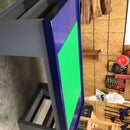Introduction: Checkerboard Table
This checkerboard table is made from maple and walnut wood.
Step 1: Strips
Strips of wood were cut from maple and walnut. Alternate each strip, one maple, one walnut. Glue the strips together. You can use a size that is the best fit for your checkers. Standard, small, or large.
Step 2: Making It "checkered"
After strip were glued together, cut across the strips. Every other strip was then flipped and glued to give it the "checkered" look.
Step 3: Sanding
Sand, sand, sand to get it as smooth as possible. Then walnut was chosen for the the frame to surround the checkerboard.
Step 4: Framing
After measuring, cut the frame. Glue and clamp.
Step 5: Slats
Cut slats that will support the checkerboard. Glue and use screws to secure.
Step 6: Add Checkerboard
Drop in the checkerboard and glue. Let dry overnight.
Step 7: Legs and Support
Attach legs by using screws and a Kreg jig. Support boards will help make it more sturdy.
Step 8: Finish
Apply several coats of clear coat to get your desired sheen.
Step 9: Completed Checkerboard
Enjoy playing a game of checkers on your newly completed table.




